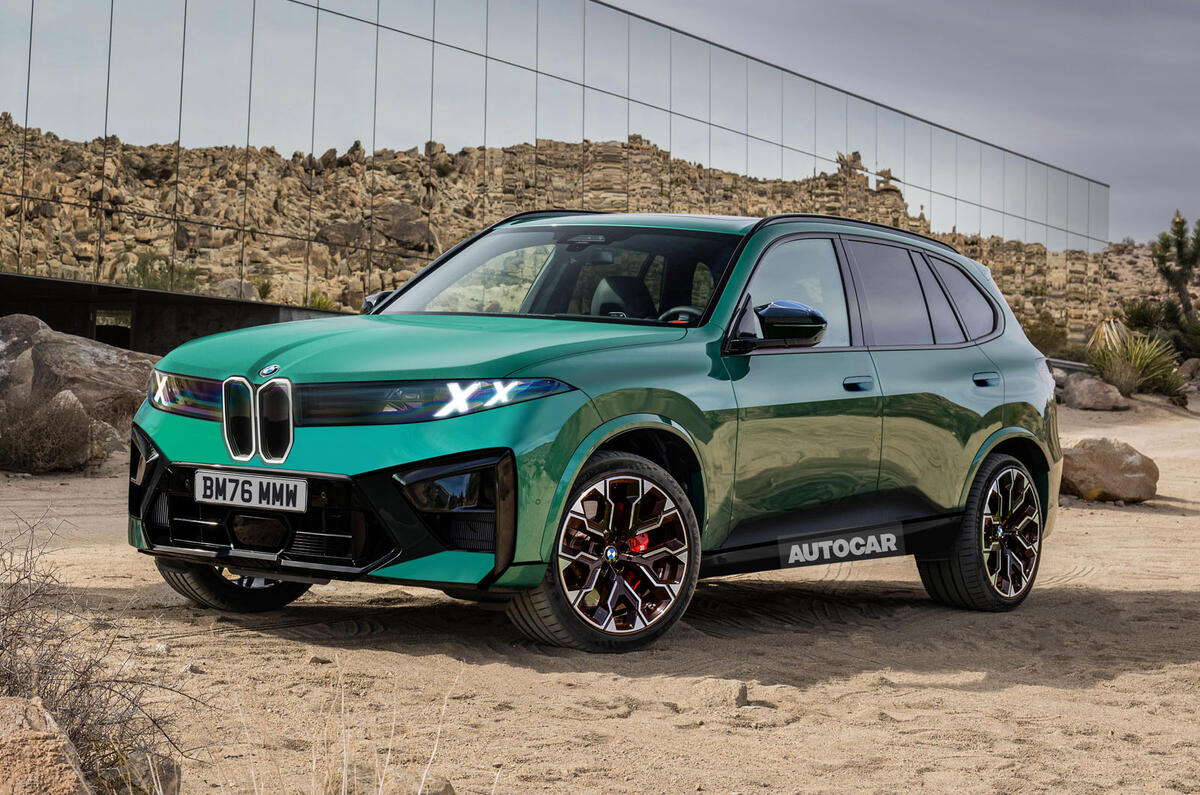The BMW iX5 will arrive in 2026 as the first of six new launches in three years that will fully electrify the German firm’s SUV line-up.
This engineering programme is being described as one of the most comprehensive ever undertaken by BMW and its M performance car division.
Notably, a hydrogen-powered iX5 will join the line-up in 2028, using a powertrain co-developed with Toyota. This version will be followed by multiple other fuel cell variants of existing models by the end of the decade.
Alongside the pure-electric iX5 due next year, there will be a new, fifth-generation X5 – BMW’s original SUV, with 2.2 million sales since 1999 and counting. The new X5 will be fitted with upgraded petrol, diesel and plug-in hybrid drivetrains.
Unlike the upcoming iX3, which will be underpinned by BMW’s Neue Klasse platform, both the iX5 and the X5 will be based on an upgraded version of BMW’s Cluster Architecture (CLAR) platform, Autocar has been told.
This decision is understood to be a result of the need to continue offering the big-selling X5 with its full cohort of combustion-engine options. Switching to the Neue Klasse architecture would have required the X5’s ICE powertrains to be heavily modified to fit into a platform built predominantly for EVs, resulting in excessive extra costs.
The fact that the X5 and iX5 will both be produced at BMW’s Spartanburg manufacturing facility in the US, which is currently undergoing a £1.27 billion upgrade, is another reason for the CLAR decision, Autocar understands.
Regardless, BMW will fit the new pair with key features that will be introduced with Neue Klasse. The iX5, for example, is set to adopt sixth-generation electric drive components, new-generation batteries with round cells featuring greater energy density than those in use today, and a fully networked 800V electric architecture.
Explaining the process by which the upgraded CLAR platform adopts elements from Neue Klasse, BMW head of R&D Frank Weber said: “We are in a phase where flexibility is required. We have to detach ourselves from how we have perceived platforms up to now.
“There is an increasing realisation that the art of mastering diversity in your portfolio lies in how you use and network major components – engines, motors, battery cells, on-board computers, control units, app functions, and software upgrades.
It’s not so much the platform structure itself but the individual components and how you use them.”
The reworked CLAR platform will also provide the basis for the new X6 and X7 models. The second-generation X7 will be launched in 2027 and the fourth-gen X6 in 2028, according to details provided to US dealers.
The pair are planned to spawn the iX6 and iX7, meaning that all of BMW’s SUV line-up will offer an electric option.
Disguised prototypes testing in Europe reveal that the new X5 will retain the familiar silhouette of its predecessor. However, its length is expected to exceed five metres for the first time due to a longer wheelbase, required to accommodate the iX5’s battery pack. This increase in size will put the iX5 on a par with the luxury-focused iX, which will be facelifted in the first quarter of this year and remain in production until 2028.






Join the debate
Add your comment
I simply don't believe the X5 and iX5 will use the platform strategy outlined in this article. the logical path to take is do exactly what they're doing with the next gen 3 series and i3. A updated CLAR 3er and Neue Klasse i3 with broadly similar looks. Each platform playing to its strengths.
Of all the companies... BMW... Shame on them being seduced by Toyota's dirty lucre. By any measure, Hydrogen does not make sense for road transport. It is either highly polluting (methane reforming producces 8kg of CO2 for every 1kg of Hydrogen produced), or extremely uncompetitive. Green Hydrogen would cost at least 3 times that of charging a BEV for the same travel distance (at 30% efficiency vs 90%). Then there's the absurd cost of the vehicle. Oh, and a total waste of clean water. Did someone mention the cost and maintenance of an electroliser, compresser, storage, transport... and the fact that Hydrogen is pest to contain? Inevitable leaks contribute to climate change too, as it interfers and slows the depletion of methane in the atmosphere. Hydrogen is necessary for many processes (e.g. ironically, oil refining) so how about we save the precious Green stuff to displace the dirty Grey stuff, rather than wasting it where there is a economically and environmetally superior alternative?!
100% spot on - couldn't have put it better myself
BMW are using hydrogen as a predatory delay tactic to sell more combusion vehicles. We know they are aware this has no future, evidenced by borrowing Toyota tech rather than wasting their own resources.
They just need enough people to "wait for hydrogen" and buy another combustion car to keep them going.
I used to love BMW but I won't be back until they stop this nonsense and make a ground-up BEV rather than something compromised by a shared combustion platform.